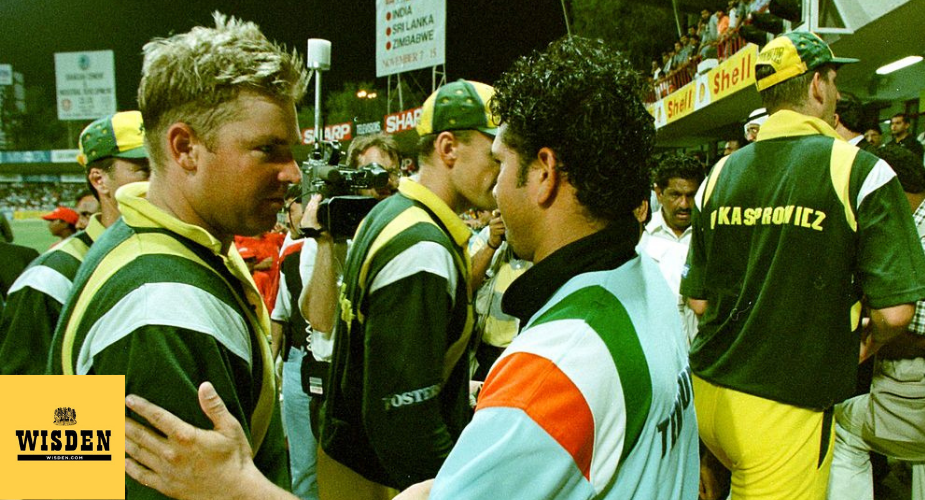Wisden’s ODI innings of the 1990s, No.1: Sachin Tendulkar’s 143

The first of Sachin Tendulkar’s twin Sharjah epics, universally known as the Desert Storm knocks, was voted as the ODI innings of the 1990s in Wisden’s 1990s in Review series.
Sachin Tendulkar 143 (131 balls)
Australia v India, 6th ODI, Coca-Cola Cup
Sharjah Cricket Stadium
April 22, 1998
It’s a knock that seems to increase in awe-factor the more you watch it, even all these years later. It’s been acknowledged and accepted as one of the all-time great ODI feats, and as with many things Sachin in that decade, the impact on the field was matched by the effect on how the Indian side was perceived.
It had all the ingredients that typically go into the makings of a all-timer. There was, of course, the brilliance and the pure skill of the protagonist. It had Australia, a heavyweight and the No.1-ranked ODI side at the time, taking on a decidedly less assured team in India.
It pit against each other two supreme craftsmen in Tendulkar and Shane Warne at the peak of their powers. And there were high stakes, with India needing to score at least 237 in their revised chase of 276 to make the final of the Coca-Cola Cup. And for good measure, there was drama too, with a sand storm delaying proceedings for 25 minutes.
Bear in mind this was the Nineties. Totals approaching 300 were considered unchaseable – Australia posted 284-7 – and the dry, draining heat of Sharjah made the task that much more daunting. Tendulkar ended up scoring a 131-ball 143, A strike-rate of 109.16 is brisk by modern measures. By the standards of the time, however, this was a truly explosive knock.
Tendulkar’s intent was obvious in the sixth over, when Michael Kasprowicz sent down a couple of short deliveries, and the Indian boy-wonder pulled them over midwicket, the second travelling further than the first. The volume rose among the Sharjah crowd, and throughout the evening, they reflected the Indian mood: jubilant and disbelieving.
Tendulkar’s sixes were the theme of the innings. While those early strikes against Kasprowicz were played with the horizontal bat, Tendulkar’s straight-batted strokes were even more staggering. Like the one in the 32nd over, against the hapless Kasprowicz again, that was deposited back over the bowler’s head. It meant the wickets India lost in the middle overs – Nayan Mongia, Mohammad Azharuddin and Ajay Jadeja fell in quick succession as they slid to 138-4 – didn’t slow the team down. Tendulkar kept them going, carrying them single-handledly – and if you want a quintessential theme for the Nineties, look no further.
After Tendulkar brought up his century in the 39th over – Sharjah was absolutely buzzing by this point – he seemed tired, taking deep breaths and walking, perhaps, a bit gingerly. Incredibly, his most audacious hits were yet to come. “They’re dancing in the aisles of Sharjah,” the great Tony Greig, giddy with excitement, famously said on air.
The hits continued, with two more audacious sixes in the 42nd over, and fortune favoured him as well, with Damien Martyn dropping him at midwicket. He helped India cross the 237 mark that ensured they would qualify for the final over New Zealand. And eventually, he was dismissed, looking to pull one from Fleming that was going down leg. But the umpire was unconvinced, and Tendulkar walked.
India may well have gone on to win that match had Tendulkar hung around. Instead, in the next 18 balls, they managed just eight runs and finished on 250-5, as Australia won the match by 26 runs. It didn’t feel like it, though. It felt like an India victory – playgrounds in India the next day were buzzing with wannabe Sachins – and Tendulkar was well and truly heralded as a nation’s poster boy when he repeated the feat a few days later, on his 25th birthday no less, scoring another ton in the final. And this time, India won.
It was a sweet summer.

